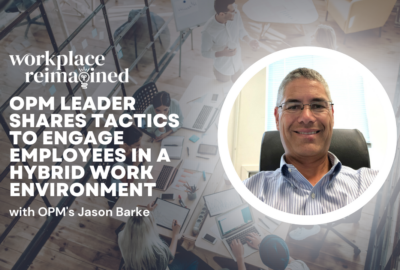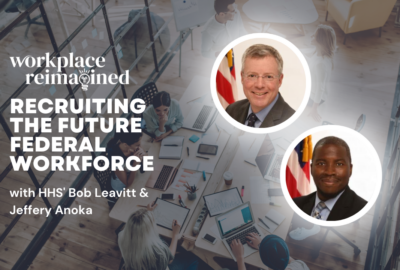Insight by HireVue
Workplace Reimagined 2023: HireVue’s Lindsey Zuloaga on evolving recruitment technology
Tools that can target the right candidates, make the application process less burdensome and let agencies sort vast numbers of resumes will not make federal hiring...
Getting the right job candidate in the door is vital to an agencies’ success at the end of the day. But to get there, the recruitment process at the front end needs to be tailored to seek out the specific competencies and attributes that a hiring manager seeks.
Lindsey Zuloaga, chief data scientist at HireVue, said the technology that agencies, and other employers, use in recruitment is key to reaching that high-quality hire while at the same time ensuring speed and fairness.
“Candidates do complete a lot of the hiring process on their own time, often on their phone, when they have these tools to interact with. That opens up the funnel for a wider range of applicants,” Zuloaga told Federal News Network during Workplace Reimagined 2023.
At a time when agencies are facing critical skills gaps in areas like cybersecurity, reaching a broader applicant pool becomes all the more critical. To try to tap into a bigger range of applicants, the government is embarking on a move toward skills-based hiring — focusing on job candidates’ skills, rather than their educational background, in position requirements. Emphasizing skills can reap all kinds of benefits, Zuloaga said.
“When we focus on skills and competencies, we see not only an increase in the quality of hire, but an increase in overall diversity of hires as well,” she said.
Zuloaga said HireVue’s process reflects and anticipates that transition, focusing on skills and competencies rather than just college degrees or GPAs — many traditional assessment measures don’t show a lot of correlation with job performance.
“When you’re looking for specific competencies and attributes, it’s important to structure the hiring process around that,” she advised.
Considering the applicants’ perspective
Before finding the best candidate at the end of the day, it’s important to take into account the perspective of all applicants as they move through the hiring process. It’s especially crucial as agencies compete against the private sector to hire employees — and time-to-hire is a key factor.
“All organizations have to move fast to attract the top talent,” Zuloaga said. “Sometimes you’ll find a good candidate, and as soon as you even see them, they’re already talking to someone else. Because people have other opportunities. That is a powerful position for candidates to be in.”
For agencies, how consistently they communicate with each candidate throughout the process can impact an applicant’s decision when it comes to the end of the hiring process and making a selection for an opening.
“Encouragement and feedback make a big difference in the candidate’s experience and their willingness to consider you as an employer,” Zuloaga said.
And communication is significant even for those who ultimately don’t get selected for a position.
For example, HireVue found that telling candidates about their performance during an assessment or interview, as well as areas they might want to work on, is highly popular with candidates, Zuloaga said. It gives them something tangible and worthwhile in exchange for the time they take to apply and interview for a position, she added.
“Even if they’re not selected for that job, at least it was a beneficial experience,” Zuloaga said. “Candidates are coming to expect that more and more.”
Developing fair use of AI in hiring
Although communication is important, many federal hiring managers also often have to handle massive numbers of resumes, which can’t be combed through without some sort of automated process. The sheer volume and time it takes to consider candidates for an open position makes the use of artificial intelligence in the hiring process all the more appealing.
“As a pioneer in this field, we have been a voice in many of those conversations, bringing in our experience,” Zuloaga said. “We have customers that have hundreds or thousands of candidates for every open role. That’s a reality that a lot of people don’t necessarily realize. There has to be automation.”
Even though the technology continues to develop, the process of assessing candidates isn’t new. Still, managers have to be careful in their use of AI in the hiring process — without proper oversight, AI systems can mimic and exacerbate human bias.
“For decades and decades, people have been assessing candidates for jobs,” Zuloaga said. “Whether it’s some machine learning algorithm or it’s a multiple choice, pencil and paper test, there are standards around how you look at differences between demographic groups.”
But if the proper safeguards are put in place from the beginning, AI in hiring can \ be beneficial to agencies handling massive numbers of simultaneous open positions and resumes.
“There have to be fair ways of evaluating candidates when humans can’t necessarily do that,” Zuloaga said. “If care is taken, [AI systems] can work against the human bias that has really plagued hiring historically. If we have proper legislation and understanding of the power here, we can really use these systems, with fairness in mind, to optimize that process and make sure we really minimize adverse impacts for underrepresented candidates.”
To watch and read more from 2023 Workplace Reimagined, visit our event page.
Copyright © 2024 Federal News Network. All rights reserved. This website is not intended for users located within the European Economic Area.
Related Stories
Featured speakers
-

Lindsey Zuloaga
Chief Data Scientist, HireVue
-

Drew Friedman
Reporter, Federal News Network
Upcoming Events
Related Stories
Top Stories

Lindsey Zuloaga
Chief Data Scientist, HireVue
Dr. Lindsey Zuloaga is the Chief Data Scientist at HireVue, managing a team that builds and validates machine learning algorithms to predict job-related outcomes. As an academic researcher with a Ph.D. in Applied Physics, she has performed novel experiments and data analysis, resulting in scientific publications with applications in medicine, sensing, and signal processing. Lindsey started her data science career in the healthcare space, striving to improve the lives of people with chronic health conditions. At HireVue, she is working to completely transform traditional interviewing with a platform that focuses on understanding more of the candidate as a whole person, including interview responses, coding abilities, and cognitive skills as opposed to just the facts shown on a resume. Lindsey received her Ph.D. in applied physics from Rice University.

Drew Friedman
Reporter, Federal News Network
Drew Friedman is Federal News Network’s reporter covering workforce, pay and benefits. She previously worked as a producer for the program Government Matters at WJLA-TV, covering the business of the federal government. Drew graduated from the University of Virginia in 2018 with a B.A. in media studies.





